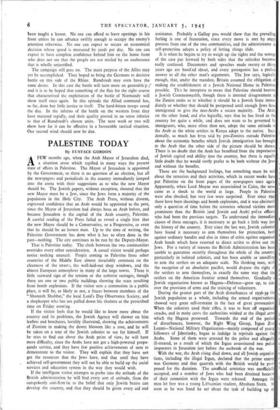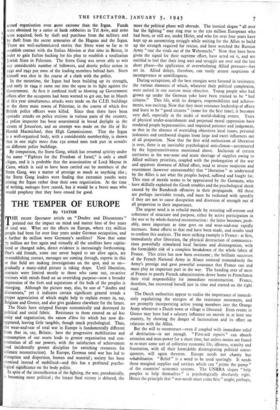PALESTINE TODAY
By EUSTACE GORDON
AFEW months ago, when the Arab Mayor of Jerusalem died, a situation arose which typified in many ways the present State of affairs in Palestine. The Mayor of Jerusalem is appointed by the Government, so there is no question of an election, but all the newspapers and periodicals in the country immediately jumped into the arena with their suggestions as to who the new Mayor ihould be. The Jewish papers, without exception, shouted that the new Mayor must be a Jew, since the Jews form a majority of the population in the Holy City. The Arab Press, without dissent, expressed confidence that an Arab would be appointed to the post, since the Mayor of Jerusalem had always been an Arab before, and because Jerusalem is the capital of the Arab country, Palestine. A careful reading of the Press failed to reveal a single hint that the new Mayor should be a Conservative, or a Progressive, or even that he should be an honest man. Up to the time of writing, the Palestine Government has done what it has so often done in the past—nothing. The city continues to be run by the Deputy-Mayor.
That is Palestine today. The clash between the two communities overrides every other consideration. A casual visitor would perhaps notice nothing unusual. People coming to Palestine from other countries of the Middle East almost invariably comment on the cleanness of the streets, the well-laid-out shop windows, and the almost European atmosphere in many of the large towns. There is, little outward sign of the tension or the terrorist outrages, though there are one or two public buildings showing the scars resulting froni bomb explosions. If the visitor sees a commotion in a public place, it will be, as likely as not, a fracas between members of the " Shomreh Shabbat," the local Lord's Day Observance Society, and a shopkeeper who has not pulled down his shutters at the prescribed time on Friday evening.
If the visitor feels that he would like to know more about the country and its problems, the Jewish Agency will shower on him leaflets and brochures, lavishly illustrated, showing the achievements of Zionism in making the desert blossom like a rose, and be will be taken on a tour of the Jewish colonies to see for himself. If he tries to find out about the Arab point of view, he will have more difficulty, since the Arabs have not got a high-powered propa- ganda service, and they have few positive achievements of note to demonstrate to the visitor. They will explain that they have not got the resources that the Jews have, and that until they have achieved self-government they will not be able to build up the social services and education system in the way they would wish.
If the intelligent visitor attempts to probe into the attitude of the British administration he-will find every sort of attitude, fiom the outspokenly anti-Semitic to the belief that only Jewish brains can develop the country, and that they should be given every aid and
assistance. Probably a Gallup pots would show that the prevailing feeling is one of frustration, since every move is met by angry protests from one of the two communities, and the administrator in self-protection adopts a policy of letting things slide.
It is when he begins to try to weigh up the rights and the wrongs of the case put forward by both sides that the onlooker becomes really confused. Documents and speeches made twenty or thirty years ago are bandied about, and every protagonist has a perfect answer to all the other man's arguments. The Jew says, logically enough, that, under the mandate, Britain assumed the obligation of making the establishment of a Jewish National Home in Palestine possible. This he interprets to mean that Palestine should become a Jewish Commonw.ealth, though there is internal disagreement in the Zionist ranks as to whether it should be a Jewish State imme- diately or whether that should be postponed until enough Jews have immigrated to give the non-Arabs a secure majority. The Arab, on the other hand, and also logically, says that he has lived in the country for quite a while, and does not want to be governed by immigrants, who, more often than not, adopt the same attitude to the Arab as the white settlers in Kenya adopt to the native. Inci- dentally, so much has been said by pro-Zionists outside Palestine about the economic benefits which Jewish immigration has brought PO the Arab that the other side of the picture should be shown. There is no doubt that the Arab has benefited from the importation of Jewish capital and ability into the country, but there is equally little doubt that he. would vastly prefer to be both without the Jews and without the benefits.
These are the background feelings, but something must be said about the terrorists and their activities, which in recent weeks have put Palestine on the front pages of the newspapers once again Apparently, when Lord Moyne was assassinated in Cairo, the news came as a shock to the world at large. People in Palestine were also shocked, but very few were surprised. Ever since 1941 there have been shootings and bomb explosions, and it was obviously only a question of time before the terrorists selected victims more prominent than the British (and Jewish and Arab) police officers who had been the previous targets. To understand the immediate causes of these outrages, it is necessary to go back a little way into the history of the country. Ever since the last war, Jewish colonists have found it necessary to arm themselves for protection, both against ordinary bandits and also in times of crisis against organised Arab bands which have resorted to direct action to drive out the Jews. For a variety of reasons the British Administration has been unable to guarantee security throughout the whble of the country, particularly in isolated colonies, and has been unable or unwilling to arm the settlers on an adequate scale. No thinking man, with the exception of an absolutist pacifist, would dispute the right of the settlers to arm themselves, in exactly the same way that the settlers on the American frontier armed themselves. Gradually a Jewish organisation known as Hagana—Defence—grew up, to take over the provision of arms and the training of volunteers.
During the greater part of the Arab disturbances of 1936-39 the Jewish population as a whole, including the armed organisation showed very great self-restraint in the face of great provocation. When the colonists used their rifles, it was to beat off organised attacks, and in many cases the authorities winked at the illegal arms which the Hagana possessed. Towards the end of the period of disturbances, however, the Right Wing Group, Irgun Zvai Leumi—National Military Organisation—mainly composed of young followers of Jabotinsky, began to indulge in reprisals against the Arabs. Some of them were arrested by the police and allegedly ill-treated, as a result of which tlie Irgun assassinated two police inspectors in Jerusalem just before the outbreak of the war.
With the war, the Arab rising died down, and all Jewish organisa- tions, including the illegal Irgun, declared that the prime enemy was Germany and that quarrels with the British would be post poned for the duration. The unofficial armistice was unofficially accepted, and a number of Jews who had been detained because of their connexion with the Irgun were released. Amongst th men let free was a young Lithuanian student, Abraham Stern. As soon as he was freed he ser about the task of building up an
armed organisation even alore extreme than the Irgun. Funds were obtained by a series of bank robberies in Tel Aviv, and arms were acquired, both by theft and purchase from the military and by theft from the secret armouries of the Hagana and the Irgun. There are well-authenticated stories that Stern went so far as to establish contact with the Italian Mission at that time in Beirut, in order to gain Italian backing for his plan to establish a totalitarian Jewish State in Palestine. The Stern Gang was never able to win any considerable number of followers, and drastic police action in 1941 and 1942 put most of the leading members behind bars. Stern himself was shot in the course of a clash with the police.
In the meantime, the Irgun had been building up its strength, and early in 5944 it came out into the open in its fight against the Government. At first it confined itself to blowing up Government offices after the occupants had been warned to get out, but in March of this year simultaneous attacks were made on the C.I.D. buildings in the three main towns of Palestine, in the course of which five British police officers were killed. Since then there have been sporadic attacks on police stations in various parts of the country, a police inspector has been assassinated in broad daylight in the streets of Jerusalem, and an attempt was made on the life of Sir Harold Macmichael, then High Commissioner. That the Irgun is a well-organised body, with a considerable membership, is shown that in one night more than I5o armed men took part in assaults on different police buildings.
By comparison, the Stern Gang, which has resumed activity under the name " Fighters for the Freedom of Israel," is only a small clique, and it is probable that the assassination of Lord Moyne in Cairo, which is said to have been carried out by members of the Stern Gang, was a matter of prestige as much as anything else ; the Stern Gang leaders were finding that extremist youths were joining the Irgun rather than their own organisation. At the time of writing, outrages have ceased, but it would be a brave man who would prophesy that they have ceased for good.



























 Previous page
Previous page